However, after nearly 10 years of implementation, the process of applying the Penal Code has also encountered some difficulties and shortcomings, requiring amendments and supplements to suit reality and protect basic human rights.
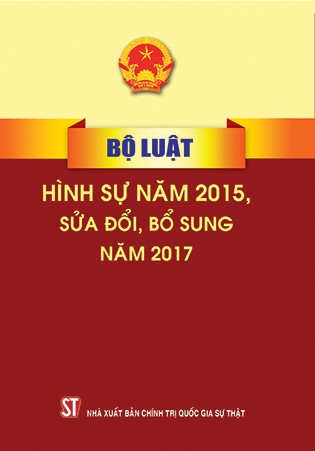 |
| Penal Code 2015 (amended and supplemented in 2017). |
Practical problems arise
With the rapid changes in socio-economic conditions and legal documents, criminals are always looking for new ways to evade the law. The 2015 Penal Code (amended and supplemented in 2017) has given rise to a number of difficulties and inadequacies compared to reality, requiring appropriate and synchronous adjustments with other relevant laws.
Firstly, the basis for exemption from criminal liability is not uniform and can be understood in different ways.
Clause 3, Article 29 of the 2015 Penal Code stipulates: “A person who commits a less serious crime or a serious crime unintentionally causing damage to the life, health, honor, dignity or property of another person and is voluntarily reconciled by the victim or the victim's representative and requested to be exempted from criminal liability, may be exempted from criminal liability.”
So it can be understood that a person who commits a less serious crime can be exempted from criminal liability only in the case of "unintentional" damage to the life, health, honor, dignity or property of another person and the victim or the victim's representative voluntarily reconciles and requests exemption from criminal liability.
Or it is understood that a person who commits a less serious crime intentionally or unintentionally causing damage to the life, health, honor, dignity or property of another person and is voluntarily reconciled by the victim or the victim's representative and requests exemption from criminal liability, may be exempted from criminal liability.
Because the law is unclear, it is reasonable to understand it in two ways. However, it leads to inconsistent application of the Penal Code, affecting the legitimate rights and interests of suspects and defendants.
Second, the basis for deciding on punishment is not in fact commensurate with the nature and level of danger to society and is not suitable with the personality of the offender.
According to Clause 1, Article 50 of the 2015 Penal Code, when deciding on the penalty, the Trial Panel shall base on the following grounds: i) Provisions of the 2015 Penal Code; ii) The nature and level of danger to society of the criminal act; iii) The personality of the offender; iv) Circumstances mitigating criminal liability; v) Circumstances aggravating criminal liability.
Through research, it is shown that the current Penal Code has no specific provisions on "The nature and level of danger to society of the criminal act" and "the offender's personality". To assess the nature and level of danger to society of the act based on the nature of the violated social relationship; the nature of the objective act, including the nature of the method, tricks, tools and means of committing the crime; the level of causing or threatening to cause to the violated social relationship; the nature and level of fault; the motive and purpose of the offender; the political and social circumstances and the place where the crime occurred.
Reality over time shows that the Court's decision on the level of punishment is either too low or too high, not commensurate with the nature and level of danger to society of the crime and not suitable with the personality of the offender.
Therefore, clearly explaining the two bases for deciding on punishment , "The nature and level of danger to society of the crime"; "the offender's personal background" in Article 50 of the 2015 Penal Code will ensure the legitimate rights of suspects and defendants, and limit the decision on punishment based on the subjective will of the prosecution agencies.
Third, the provisions on fixed-term imprisonment for people under 18 years of age have many interpretations and apply different penalties to the same crime.
Studying the content of the provisions of Article 101 of the 2015 Penal Code, the phrase "the level of imprisonment prescribed by law" in Clauses 1 and 2 leads to many different interpretations, applying different penalties to the same criminal act. Specifically:
First way: if it is a fixed-term imprisonment, the highest penalty applied shall not exceed three-quarters (for persons from 16 years old to under 18 years old) and not exceed one-half (for persons from 14 years old to under 16 years old) of the prison term that the law prescribes to be applied to persons 18 years old or older.
Second understanding: if it is a fixed-term imprisonment, the highest penalty applied shall not exceed three-quarters (for persons from 16 years old to under 18 years old) and not exceed one-half (for persons from 14 years old to under 16 years old) of the highest prison sentence prescribed by law.
Third understanding: if it is a fixed-term imprisonment, the highest penalty applied shall not exceed three-quarters (for persons from 16 years old to under 18 years old) and not exceed one-half (for persons from 14 years old to under 16 years old) of the highest prison sentence prescribed by the penalty framework of the law.
Fourth, the provisions on framing circumstances in some laws are unreasonable.
In the group of crimes against property, the 2015 Penal Code (amended and supplemented in 2017) stipulates the basic circumstances for determining the crime in Clause 1 of Articles 172, 173, 174, 175 of the 2015 Penal Code: " Having been administratively punished for the act of appropriating property but still committing the violation; Having been convicted of this crime or of one of the crimes specified in Articles 168, 169, 170, 171, 172, 173, 174, 175 and 290 of the Code, not yet had the criminal record cleared but still committing the violation".
However, Clause 2 (aggravated framework) of all four of these Articles (Articles 172, 173, 174, 175 of the current Penal Code) stipulates the basis for "dangerous recidivism" leading to overlap with Clause 1 (basic framework).
Fifth, there are no regulations on criminal liability for acts of causing disturbance or terrorizing others to collect debt.
Currently, the situation of throwing waste and dirt into people's houses, residences and properties is happening in many localities, causing public outrage. Most of the cases discovered are to serve debt collection activities.
However, these acts do not cause damage to people's property, health, or lives, do not violate people's residences, do not take place in public places, and are repeated acts to terrorize the mind to collect debts; currently, there is no criminal mechanism to handle them, only administrative handling according to the provisions of Decree No. 144/2021/ND-CP of the Government .
Therefore, it is necessary to add this behavior to Section 4 of Chapter XXI - Other crimes against public order - to severely punish these dangerous behaviors and protect the legitimate rights and interests of citizens.
Sixth, the provision that relatives are not criminally responsible for concealing crimes and failing to report crimes is not truly equal.
According to the provisions of Articles 18 and 19, a person who conceals or fails to report a crime, whether it is the grandfather, grandmother, father, mother, child, grandchild, sibling, wife or husband of the offender..., will not be held criminally responsible in some cases.
Thus, if the person who conceals or fails to report is an adoptive father, adoptive mother, stepfather, stepmother, adopted child, son-in-law, daughter-in-law, stepchild of the wife, stepchild of the husband, nephew or niece (niece of paternal aunt, niece of paternal aunt...) they are not subject to the provisions of Articles 18 and 19, while they also have a close and intimate emotional relationship like the people listed in Articles 18 and 19.
Therefore, to create equality in handling criminal liability, it is necessary to add the above people to the cases of not being criminally liable as prescribed in Article 18 (Crime of concealing a crime) and Article 19 (Crime of failing to report a crime).
Seventh, there is no uniformity in the application and handling of driving behavior under the influence of alcohol.
Point b, Clause 2, Article 260 of the current Penal Code increases the level of criminal liability if a person who violates regulations on road traffic participation "uses alcohol or beer and the alcohol concentration in the blood or breath exceeds the prescribed level".
However, Clause 6, Article 5 of the 2019 Law on Prevention and Control of Alcohol Harm stipulates that the prohibited act is “driving a vehicle while having alcohol concentration in the blood or breath”. Thus, there is no consistency in the regulations between the two laws, leading to inconsistent application and handling of legal responsibilities; it is necessary to amend Article 260 of the Penal Code to be consistent with the 2019 Law on Prevention and Control of Alcohol Harm and other legal documents.
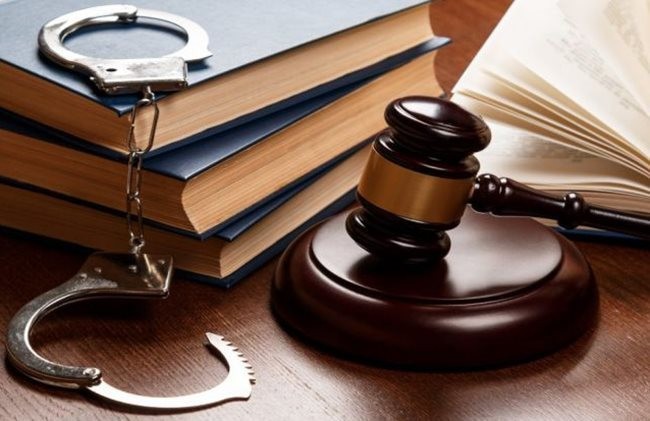 |
| Illustration photo. |
Some proposed amendments
To ensure the legitimate rights and interests of people as well as to be consistent with the Vietnamese legal system, to respond to changes in practice, within the framework of research to make contributions to the work of summarizing, evaluating, amending and supplementing the 2015 Penal Code (amended and supplemented in 2017), there are some recommendations for amendments in the following directions:
Regarding the grounds for exemption from criminal liability. Clause 3, Article 29 is amended as follows: “3. A person who commits a less serious crime unintentionally or a serious crime unintentionally causing damage to the life, health, honor, dignity or property of another person and is voluntarily reconciled by the victim or the victim's representative and requests exemption from criminal liability, may be exempted from criminal liability.”
Regarding the basis for deciding on penalties . It is necessary to add more regulations to explain more clearly the two bases for deciding on penalties: "The nature and level of danger to society of the crime"; "the personal background of the offender" in Clause 1, Article 50 so that the prosecution agencies can apply them consistently when deciding on penalties for suspects and defendants.
Regarding the provisions on fixed-term imprisonment for people under 18 years old . It is proposed to amend Article 101 of the Penal Code in the direction of removing the phrase "the level of imprisonment prescribed by law" and replacing it with the phrase "the highest level of imprisonment prescribed within the penalty framework prescribed by law".
Regarding Articles 172, 173, 174, 175. Remove the phrase in Clause 1 "Having been convicted of this crime or one of the crimes specified in Articles 168, 169, 170, 171, 172, 173, 174, 175 and 290 of the Code, not yet had the criminal record cleared but still committed the violation" to avoid duplication with the aggravating circumstance of "dangerous recidivism" in Clause 2 of the above Articles.
Add the act of "throwing waste and dirty substances into other people's houses, residences and properties" to the crime of disturbing public order (Article 318 of the current Penal Code) to effectively prevent subjects from committing the above acts of debt collection, pressure and mental terror against people, causing public outrage in recent times.
Add the group of relatives including "foster father, foster mother, stepfather, stepmother, adopted child, son-in-law, daughter-in-law, wife's stepchild, husband's stepchild, nephews and nieces (nieces and nephews of paternal aunts...)" to Clause 2, Article 18 (Crime of concealing a crime) and Clause 2, Article 19 (Crime of failing to report a crime) of the current Penal Code to ensure consistency in handling the relatives of criminals.
Regarding the crime of violating regulations on road traffic participation . It is proposed to remove the phrase "exceeding the prescribed level" in Point b, Clause 2, Article 260 to comply with Clause 6, Article 5 of the Law on Prevention and Control of Harmful Effects of Alcohol and Beer 2019 (which strictly prohibits traffic participants with alcohol concentration in their blood or breath).
Source: https://baoquocte.vn/sua-doi-bo-luat-hinh-su-bao-dam-quyen-con-nguoi-272907.html



![[Photo] Binh Trieu 1 Bridge has been completed, raised by 1.1m, and will open to traffic at the end of November.](https://vphoto.vietnam.vn/thumb/1200x675/vietnam/resource/IMAGE/2025/10/2/a6549e2a3b5848a1ba76a1ded6141fae)






















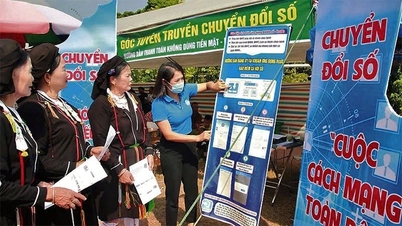







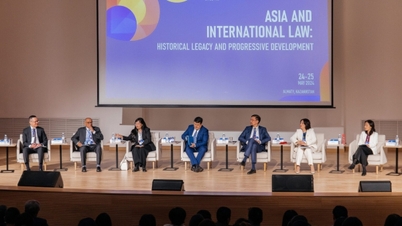

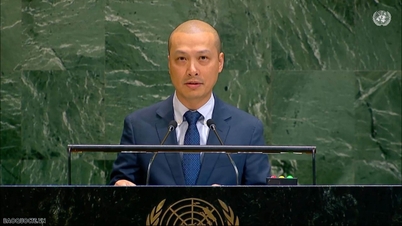
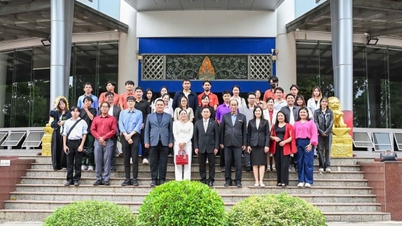
























































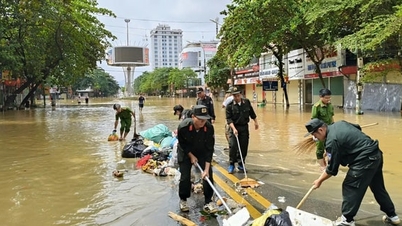












Comment (0)